Temporary protection for persons fleeing Ukraine - monthly statistics
Data extracted on 5 September 2024
Planned article update: 10 October 2024
Highlights
On 31 July 2024, slightly more than 4.1 million persons fleeing Ukraine as a consequence of the Russian invasion on 24 February 2022, had temporary protection status in EU countries.
The ratio of temporary protection beneficiaries from Ukraine relative to the EU population was 9.2 per thousand people at the end of July 2024. Czechia (33.9), ahead of Lithuania (27.4) and Poland (26.7), had the highest ratios.
In July 2024, EU countries issued 74 040 new decisions providing temporary protection.
On 4 March 2022, the European Council unanimously adopted an implementing decision introducing temporary protection for people fleeing Ukraine as a consequence of the Russian war of aggression against Ukraine that began on 24 February 2022. On 25 June 2024, the Council extended temporary protection until 4 March 2026. Temporary protection is an exceptional measure to provide immediate and temporary protection to displaced persons from non-EU countries and those unable to return to their country of origin. It applies when there is a risk that the standard asylum system will struggle to cope with demands stemming from a mass inflow, risking a negative impact on the processing of claims. This article presents the main developments in July 2024.
Full article
Key findings
- On 31 July 2024, slightly more than 4.1 million people (4 123 875), who had fled Ukraine as a consequence of the Russian war of aggression against Ukraine, were under temporary protection in the EU.
- The EU countries hosting the highest number of beneficiaries of temporary protection from Ukraine were Germany (1 110 600 people; 26.9% of the EU total), Poland (976 205; 23.7%) and Czechia (369 610; 9.0%).
- The number of persons under temporary protection relative to the EU population was 9.2 per thousand people at the end of July 2024. Among the EU countries, the highest ratios were observed in Czechia (33.9), ahead of Lithuania (27.4) and Poland (26.7).
- 98.3% of the people who fled Ukraine and were under temporary protection in the EU at the end of July 2024 were Ukrainian.
- Adult women represented 45.3% of beneficiaries of temporary protection. Children represented 32.4%, while the proportion of adult men was 22.4%.
- 74 040 new decisions providing temporary protection in the EU were made in July 2024.
Where in the EU did people fleeing Ukraine go?
At the end of July 2024, the EU countries hosting the highest number of beneficiaries of temporary protection from Ukraine were Germany (1 110 600 people; 26.9% of the EU total), Poland (976 205; 23.7%) and Czechia (369 610; 9.0%). The number of persons under temporary protection relative to the EU population was 9.2 per thousand people at the end of July 2024. Among the EU countries, the highest ratios were observed in Czechia (33.9), ahead of Lithuania (27.4) and Poland (26.7).
In comparison with the end of June 2024, Germany reported a significant decrease in the number of persons under temporary protection by the end of July 2024, with a reduction of 236,925 people (-17.6%). The decline observed in Germany is due to a methodological change that, starting in July 2024, removed from the stock of persons under temporary protection all the individuals whose temporary protection status was no longer valid either because they have been granted with another protection status or definitely left the German territory. This led to a decrease in the overall number of persons under temporary protection within the EU by 194,755 (-4.5%). Apart from Germany, the number of persons under temporary protection decreased only in 2 EU countries, namely Luxembourg (-470; -11.0%) and France (-470; -0.8%). On the other hand, the largest absolute increases in the number of persons under temporary protection were observed in Poland (+10 430; +1.1%), Czechia (+8 834; +2.4%) and Romania (+4 250; +2.6%).

Source: Eurostat (migr_asytpsm) (migr_asytpspop)
Who are the people fleeing Ukraine and receiving temporary protection?
98.3% of the people who fled Ukraine and were under temporary protection in the EU at the end of July 2024 were Ukrainian. Among other non-EU citizens under temporary protection, the main countries of citizenship were Russia (12 156; 0.29%), Nigeria (4 393; 0.12%) and Azerbaijan (4 174; 0.10%).
At the end of July 2024, adult women represented 45.3% of beneficiaries of temporary protection, 54.9% of them were women aged 35 to 64 years. Children represented 32.4%, while the proportion of adult men in the total number of beneficiaries of temporary protection was 22.4%. By contrast, the proportions of boys and girls under the age of 18 years were close, with 16.8% for boys and 15.5% for girls (Figure 1).
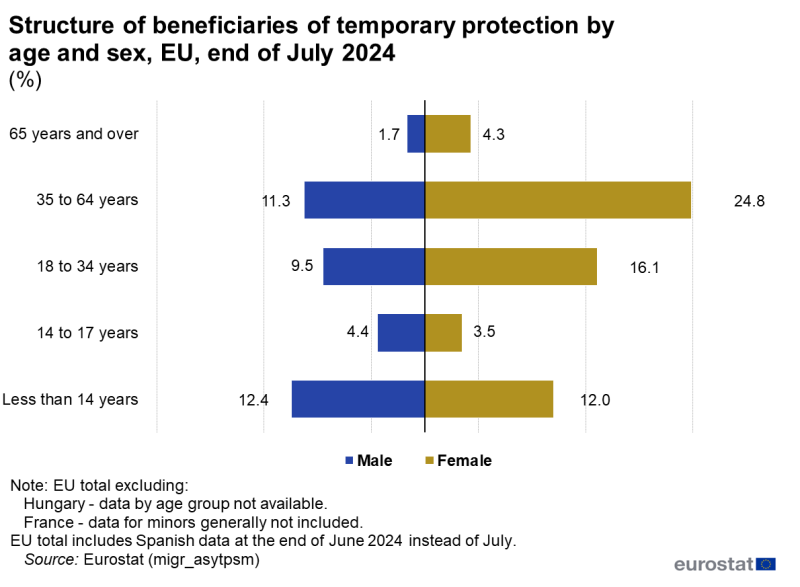
Source: Eurostat (migr_asytpsm)
The share of children (30.4%) among persons granted temporary protection during July 2024 increased by 3.4 percentage points (pp) in comparison with June 2024, while the share of adult women (41.4%) dropped by 3.4 pp and the share of adult men (28.2%) decreased by 0.8 pp (Figure 2). On a quarterly basis, the share of temporary protection decisions for adult men followed an upward trend up to the second quarter of 2024 (an increase from 7.7% to 31.9% between the first quarter of 2022 and the second quarter of 2024). This is in contrast to the proportion of decisions for children which decreased from 46.4% to 26.2% over the same period. The quarterly share of decisions for adult women followed a less pronounced downward trend with a maximum of 50.1% reached during the second quarter of 2022 and a minimum of 41.1% reached during the first quarter of 2024.
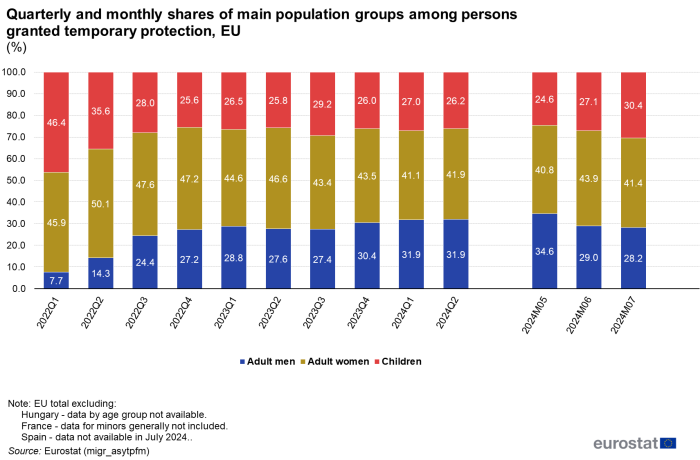
Source: Eurostat (migr_asytpfm)
How many decisions on temporary protection were issued by EU countries and EFTA countries?
In 2023, over 1 million new decisions providing temporary protection (1 056 020) were registered in the EU, compared to over 4.3 million in 2022 (4 331 385). About 75% of these decisions were taken in six countries, namely Germany (335 785, 31.8% of the EU total), Poland (237 475, 22.5%), Czechia (98 655, 9.3%), Romania (49 320, 4.7%), the Netherlands (34 775, 3.3%) and Spain (33 915, 3.3%) (Table 1).
During the second quarter of 2024, EU countries issued 195 270 decisions providing temporary protection. This is the lowest quarterly number of decisions since the beginning of the Russian invasion. Compared with the first quarter of 2024, the number of decisions during the second quarter of 2024 decreased by 0.8%. 10 EU countries issued fewer decisions providing temporary protection during the second quarter of 2024 with the sharpest declines recorded in Germany (-20 400, -28.1%), Italy (-2 170, -33.1%) and Ireland (-815, -25.9%). A rise was observed during the second quarter of 2024 in 17 countries, with the 3 largest absolute increases being recorded in Romania (+4 350), Poland (+3 710) and Bulgaria (+3 345).
On a monthly basis, 74 040 new decisions providing temporary protection in the EU were issued in July 2024, marking a 19.7% increase from June. Twenty EU countries issued more decisions in July 2024 than in June, with the highest increases observed in Czechia (+4 220), Poland (+2 645) and Germany (+1 905). Conversely, among the six EU countries that issued fewer decisions in July compared with June, the largest decreases were seen in Bulgaria (-570) and Denmark (-80).
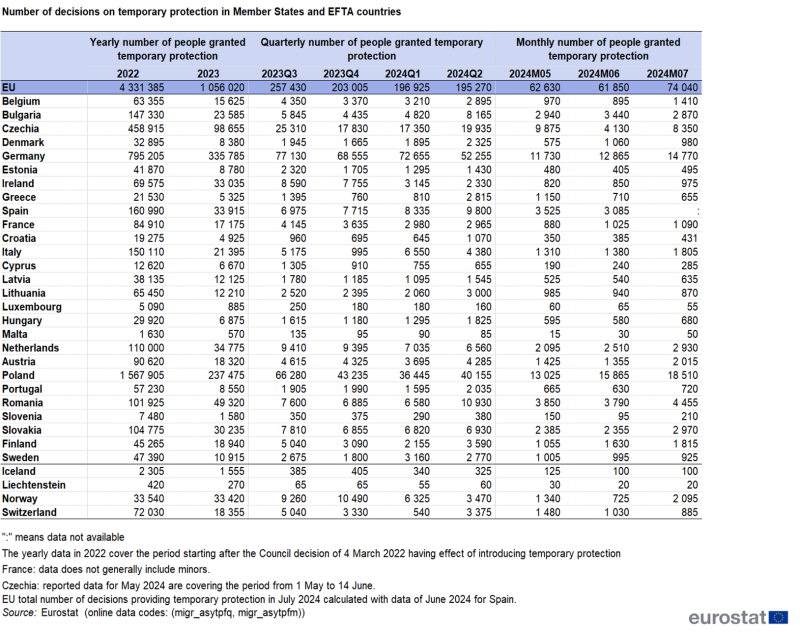
Source: Eurostat (migr_asytpfm), (migr_asytpfq)
Where did unaccompanied minors fleeing Ukraine go?
Since March 2022, 18 EU countries and all EFTA countries provided data on unaccompanied minors fleeing from Ukraine.
Of the EU countries for which data are available, Austria (2 050), Belgium (1 585) and the Netherlands (1 585) have granted the most temporary protection statuses, in absolute terms, to unaccompanied minors since March 2022 (Table 2). In relative terms, the highest share of unaccompanied minors in the total number of children granted temporary protection was recorded in Croatia (12.7%) (Figure 3).
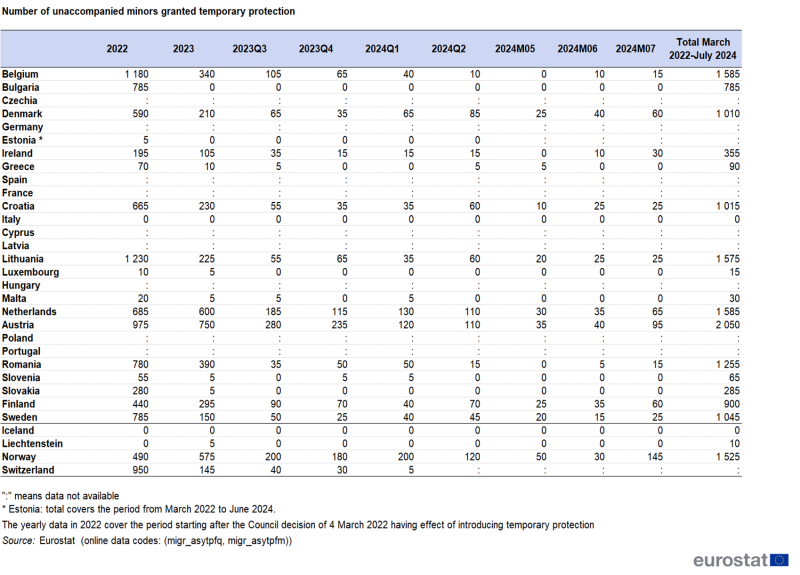
Source: Eurostat (migr_asytpfm), (migr_asytpfq)
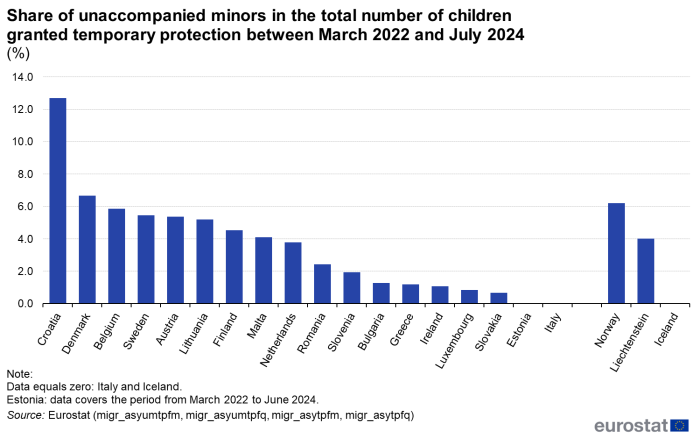
Source: Eurostat (migr_asytpfm), (migr_asytpfq), (migr_asyumtpfm), (migr_asyumtpfq)
Source data for tables and graphs
Data sources
The data used for this publication are provided to Eurostat by the interior and justice ministries or immigration agencies of the EU Member States and EFTA countries. Data on temporary protection are collected monthly on a voluntary basis. They are based entirely on relevant administrative sources and supplied in accordance with the provisions of Article 4 of the Regulation (EC) No 862/2007 on community statistics on migration and international protection. Statistics on unaccompanied minors presented in the article refer to the age accepted by the national authorities, and generally before the age assessment procedure was carried out/completed due to the data reporting deadline.
Structures by age and by sex have been calculated based on available data while disregarding the unknown category.
Some data are unavailable. This is because the monthly data collection is carried out on a voluntary basis, so the completeness of the data may vary:
- As a result of the delay in renewal of temporary protection statuses in Sweden in March 2023 and 2024, the total number of beneficiaries at the end of March, April, and May for both years is provisional and may be subject to revision.
- Germany: data on decisions providing temporary protection and on number of beneficiaries at the end of the month are not available for March-July 2022. Delays in the registration of flows in Germany may lead to misalignment between flow and stock data.
- France: in most cases, minors can stay in France without a permit. Therefore, minors are generally not included in statistics on temporary protection. In March 2023, data were revised since March 2022.
- Italy and Iceland: unaccompanied minors are benefiting from a protection scheme other than the temporary protection status.
- Hungary: data on temporary protection broken down by age group are not available.
- Data on the number of persons under temporary protection at the end of the month until December 2022 (for the Netherlands), until January 2024 (for Bulgaria) and until June 2024 (for Germany) include some persons whose temporary protection status was no longer valid and are not comparable with data of the following reference periods.
- Spain: data on decisions providing temporary protection are not available for July 2024 and data on number of beneficiaries at the end of the month are not available for May and July 2024.
- Czechia: reported data for May 2024 are covering the period from 1 May to 14 June.
Due to the short timeline for the provision of data, figures presented may be subject to future revisions.
Context
In line with the ESS commitment to provide relevant and timely official statistics, Eurostat asked EU countries and EFTA countries to transmit voluntary monthly data within 1 month following the end of a reference period and for the first time by the end of April for the reference month March 2022 for the following data series within the framework of Eurostat data collections in the field of Asylum (Article 4 of the Regulation (EC) No 862/2007):
- Decisions during the reference period granting temporary protection status by age, sex, citizenship and type of minor (flow data).
- Beneficiaries of temporary protection at the end of the month by age, sex, citizenship and type of minor (stock data).
Temporary protection status and conditions of applications are defined by Council Directive 2001/55/EC of 20 July 2001 whereas the Council implementing decision (EU) 2022/382 of 4 March 2022 establishing the existence of a mass influx of displaced persons from Ukraine within the meaning of Article 5 of Directive 2001/55/EC is the first one with the effect of introducing temporary protection. These data are supplied to Eurostat by the national Ministries of Interior and related immigration agencies. Official statistics provided to Eurostat may differ from operational data collected under other collection frameworks in the Commission or by European or international agencies like European Union Asylum Agency (EUAA) or the UN Refugee Agency (UNHCR) for various reasons including various definitions used, frequencies, deadlines for provision and quality requirements.
Direct access to
See also
Main tables
Temporary Protection, see:
- Decisions granting temporary protection by citizenship, age and sex – quarterly data (migr_asytpfq)
- Decisions granting temporary protection by citizenship, age and sex – monthly data (migr_asytpfm)
- Beneficiaries of temporary protection at the end of the month by citizenship, age and sex – monthly data (migr_asytpsm)
- Decisions granting temporary protection to unaccompanied minors by citizenship, age and sex – quarterly data (migr_asyumtpfq)
- Decisions granting temporary protection to unaccompanied minors by citizenship, age and sex – monthly data (migr_asyumtpfm)
- Unaccompanied minors benefiting from temporary protection at the end of the month by citizenship, age and sex – monthly data (migr_asyumtpsm)
Database
Temporary Protection, see:
- Decisions granting temporary protection by citizenship, age and sex – quarterly data (migr_asytpfq)
- Decisions granting temporary protection by citizenship, age and sex – monthly data (migr_asytpfm)
- Beneficiaries of temporary protection at the end of the month by citizenship, age and sex – monthly data (migr_asytpsm)
- Decisions granting temporary protection to unaccompanied minors by citizenship, age and sex – quarterly data (migr_asyumtpfq)
- Decisions granting temporary protection to unaccompanied minors by citizenship, age and sex – monthly data (migr_asyumtpfm)
- Unaccompanied minors benefiting from temporary protection at the end of the month by citizenship, age and sex – monthly data (migr_asyumtpsm)
Dedicated section
Publications